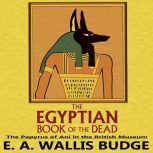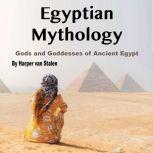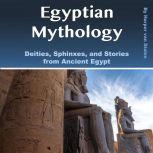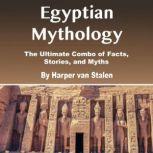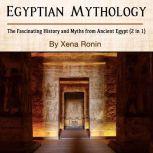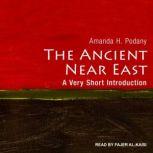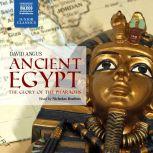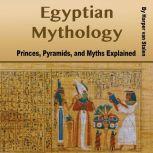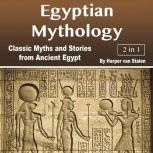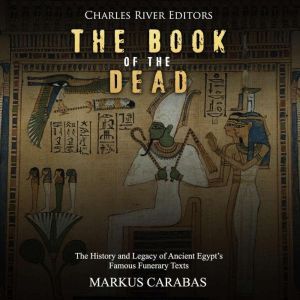
Details
Book of the Dead, The: The History and Legacy of Ancient Egypt’s Famous Funerary Texts
Author: Charles River Editors, Markus Carabas
Narrator: Jim Johnston
Unabridged: 1 hr 31 min
Format: Digital Audiobook
Publisher: Findaway Voices
Published: 03/20/2019
Genre: History - Ancient - Egypt
Synopsis
Given the abundance of funerary artifacts that have been found within the sands of Egypt, it sometimes seems as though the Ancient Egyptians were more concerned with the matters of the afterlife than they were with matters of the life they experienced from day to day. This is underscored most prominently by the pyramids, which have captured the world’s imagination for centuries. The pyramids of Egypt are such recognizable symbols of antiquity that for millennia, people have made assumptions about what they are and why they exist, without full consideration of the various meanings these ancient symbolic structures have had over the centuries. Generations have viewed them as symbols of a lost past, which in turn is often portrayed as a world full of romance and mystery. This verbal meaning has become associated with the structures through the tourism industry, where intrigue obviously boosts ticket sales. In fact, the Egyptian pyramids are so old that they were also drawing tourists even in ancient times. In antiquity, the Great Pyramid of Giza was listed as one of Seven Ancient Wonders of the World, and it is the only one still surviving today.
The age and structural integrity of the pyramids also make them symbols of longevity and power, which is only fitting because those are two purposes the ancient pharaohs who commissioned these works intended them to serve. For the pharaohs, the construction of these large monuments presented an opportunity for them to showcase their influence and become something to be remembered by, both in the society they ruled and in the annals of history that would follow. Even as new dynasties came and went, and even as Egypt was subjected to foreign domination and rulers from across the world, the pyramids have continued to stand as a prominent testament to Ancient Egypt’s glorious past.
Though the ancient tombs have been extensively plundered, they still stand as gateways to the afterlife that provide a murky window into the past of a fascinating civilization. Most importantly, the relatively untouched tomb of the young King Tutankhamun offered clear insight. Many of the objects that were discovered in Tutankhamun’s tomb were clearly made specifically for him and his burial, such as the coffins, funerary masks, canopic equipment and statues. Other objects, such as the furniture, clothing, and chariots, were obviously items that had been used during Tutankhamun’s lifetime. The motifs found upon many of his possessions depicted him in triumph over his enemies. For example, a painted wooden chest bears a fine example of such a scene; the king is shown in his chariot, followed by his troops, attacking a group of Nubians. Scenes depicting aggression and triumph over Egypt’s enemies by Egypt’s king are classical examples of Egyptian kingship.
To accomplish all the necessities the Egyptians believed in, they relied on spells and invocations, which were collected in a series of funerary texts such as the Pyramid Texts. By the era of the New Kingdom, the most popular funerary text was The Book of the Dead, one of the most evocative titles of literature in the history of humankind. Its mystical writings offer a glimpse into a realm of magical thinking beyond the skills of most writers of fiction. Resplendent with highly accomplished artwork, The Book of the Dead has enraptured scholars and laymen for centuries. For that reason, it may surprise many that The Book of the Dead does not actually exist as a book. In fact, what is referred to as The Book of the Dead today is actually the accumulation of around 400 spells that exist in transliteration and translation from the whole gamut of Egyptian history.
by E.A. Wallis Budge
The Egyptian Book of the Dead is unquestionably one of the most influential books in all of history. Embodying a ritual to be performed for the dead, with detailed instructions for the behaviors of the disembodied spirit in the Land of the Gods, it ...
Published: 07/18/2019
by Harper van Stalen
Are you ready to be both entertained and educated? In this book, you will be taught about some of the most prestigious Egyptian gods and goddesses that were worshipped a long time ago. After some educational resources and information about them...
Published: 10/28/2020
by Harper van Stalen
There are many gods and goddesses the ancient Egyptians believed in. Today, we will explore some of the most important ones, as well as expand on the stories of some heroes and characters that haven’t been forgotten through the ages. Firs...
Published: 10/31/2020
by Harper van Stalen
This is a 3-book bundle, which addresses various subtopics, including but not limited to these: Book 1: Are you ready to be both entertained and educated? In this book, you will be taught about some of the most prestigious Egyptian g...
Published: 11/03/2020
by Xena Ronin
This title consists of two books, which are the following:1: This book contains all the gods and goddesses from ancient Egypt that you can imagine. The list is long, and the names go on for a while. Needless to say, this book is complete. You won&rs...
Published: 05/11/2020
by Amanda H. Podany
The ancient Near East is known as the "cradle of civilization"—and for good reason. Mesopotamia, Syria, and Anatolia were home to an extraordinarily rich and successful culture. Indeed, it was a time and place of earth-shaking changes for huma...
Published: 06/08/2021
by David Angus
Ancient Egypt – The Glory of the Pharaohs tells us about civilisation under the pharaohs, of mysterious statues and tombs, incredible obelisks, the Sphinx… In this recording, the ancient Egyptian kingdom is brought to life in a way that...
Published: 03/26/2012
by Harper van Stalen
Are you familiar with ancient Hieroglyphs from the land of Egypt? How about pyramids and temples? Aside from touching on the facts related to these items and mysteries, this guide will also entertain you with specific stories that the Egyp...
Published: 10/29/2020
by Harper van Stalen
This is a 2-book combo, which has the following titles: Book 1: Are you ready to be both entertained and educated? In this book, you will be taught about some of the most prestigious Egyptian gods and goddesses that were worshipped a...
Published: 11/03/2020

